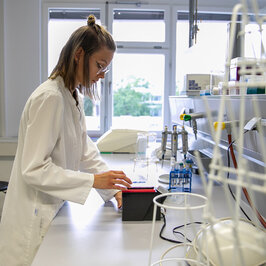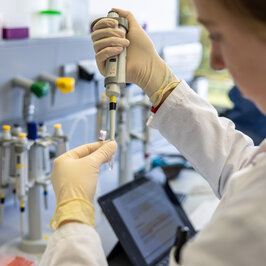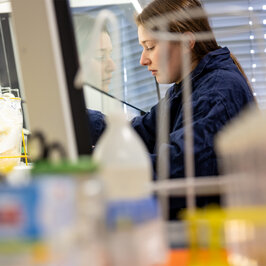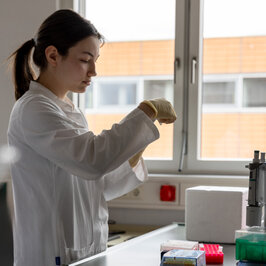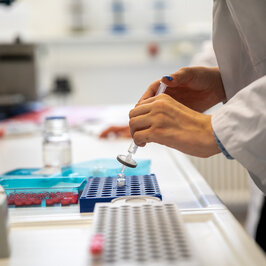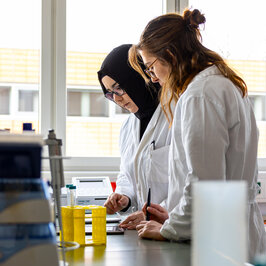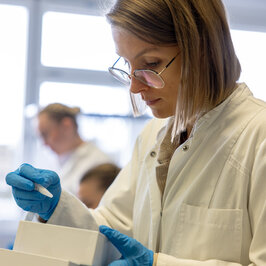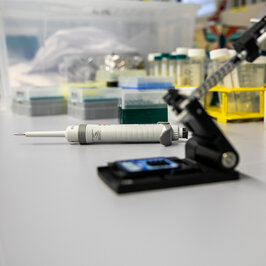Expertise in medical diagnostics
In this master's degree progamme, we combine medicine, natural sciences and technology. You'll be studying and conduct research at the interface of these disciplines and making new laboratory and analysis techniques usable for medical diagnostics. You can set your own focus according to your interests.
Programme content and structure
Medical diagnostics is constantly benefiting from new findings and technologies derived from the traditional natural sciences. These often lead to faster results and more successful medical treatments. The Precision Medicine Diagnostics degree programme was designed to meet the need for experts in the field of molecular diagnostics.
In the first semester, we teach you the basics of applied medical diagnostics in theory and practice. Building on this, you can set your own priorities in your research project in the second semester that correspond to your scientific interests – because in PMD we place particular emphasis on independent research based on solid scientific foundations. The master's thesis in the third and final semester offers a further opportunity to develop your ideas for research or application.
Entry requirements
To apply for this degree programme, you need a higher education entrance qualification (secondary school leaving certificate, e.g. general Abitur, Fachabitur). You must also have a Bachelor of Science degree, or equivalent, in a closely related field such as engineering or medicine, with at least 210 ECTS credits.
If you are not from the EU/EEA, you must have your certificates recognised by the APS (for students from China, Vietnam or India) or at the Studienkolleg of the University of Konstanz, and attach the corresponding certificate to your transcripts.
Your studies in Precision Medicine Diagnostics focus on subjects such as biochemistry, microbiology, molecular biology, physiology and statistics. You must therefore demonstrate sufficient knowledge in at least three of these subjects. You can do this by successful completion of degree programmes, practical modules or courses. You also need basic knowledge of biochemistry working techniques. To do this, you will need to provide evidence of a relevant laboratory internship at your university or outside of it, or appropriate professional experience.
And last but not least, as the degree programme is taught entirely in English, you must submit an English language certificate with at least 90 points in the IBT TOEFL, IELTS Band 6, or CEFR B2, with your application. Alternatively, language proficiency can be demonstrated by bachelor's degree programme taught entirely in English.
Your career prospects
Precision Medical Diagnostics' multidisciplinary approach and focus on developing expertise rather than pure technical knowledge offers you entry into a wide range of professional fields in the growing healthcare market and beyond.
Clinics, hospitals and large medical care units:
- Diagnostics
- Personalised medicine
- Research and development
- Planning and coordination of clinical studies
- Patient stratification
- Companion diagnostics
- Experimental and clinical pharmacology
Medical laboratories:
- Diagnostics
- Research and development
- Laboratory management
- Project management
Pharmaceutical industry:
- Quality control
- Hygiene monitoring
- Research and development
- Project management
- Support for small laboratories
- Product management and sales
Food industry:
- Quality control
- Hygiene monitoring
- Product management and sales
Research institutes, universities:
- Research and development in the field of natural sciences
- Accompanying diagnostics
- Project management
- Planning
- Implementation and documentation of experiments
Authorities and public service:
- Diagnostics
- Hygiene monitoring
- Quality control
...Or you can take the path to a Internal link opens in the same window:doctorate at HFU!
Events
Further dates and eventsUnfortunately, there are currently no events planned that we can display here. We have compiled an overview of all planned events in the event calendar.
Your key contact
We're happy to advise you on the PMD master's.
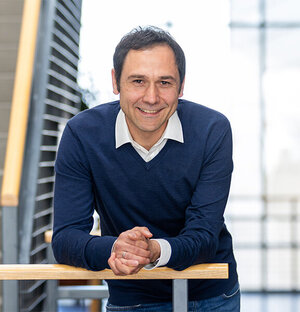
Applied Biology (BSc) (ANB)
Molecular and Technical Medicine (BSc) (MTZ)
Physician Assistant (BSc) (PA)
Precision Medicine Diagnostics (MSc) (PMD)


